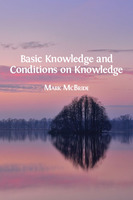Basic Knowledge and Conditions on Knowledge
Author(s)
McBride, Mark
Collection
ScholarLedLanguage
EnglishAbstract
"How do we know what we know? In this stimulating and rigorous book, Mark McBride explores two sets of issues in contemporary epistemology: the problems that warrant transmission poses for the category of basic knowledge; and the status of conclusive reasons, sensitivity, and safety as conditions that are necessary for knowledge. To have basic knowledge is to know (have justification for) some proposition immediately, i.e., knowledge (justification) that doesn’t depend on justification for any other proposition. This book considers several puzzles that arise when you take seriously the possibility that we can have basic knowledge.
McBride’s analysis draws together two vital strands in contemporary epistemology that are usually treated in isolation from each other. Additionally, its innovative arguments include a new application of the safety condition to the law.
This book will be of interest to epistemologists―both professionals and students. "
Keywords
justifications; safety condition; sensitivity; basic knowledge; epistemology; conclusive reasons; Brain in a vat; Coherentism; Dogma; Fallibilism; Foundationalism; Fred Dretske; Inference; Logical consequence; Robert NozickDOI
10.11647/OBP.0104ISBN
9781783742837OCN
1014200322Publisher
Open Book PublishersPublisher website
https://www.openbookpublishers.com/Publication date and place
2017Classification
Philosophy of language
Cognitive studies
Philosophy: epistemology and theory of knowledge


 Download
Download Web Shop
Web Shop